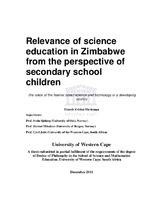| dc.description.abstract | In all countries, regardless of culture and level of development, science and technology(S&T) are seen as key areas for further material development and welfare. A certain proportion of the population needs to develop S&T-related skills and competences at a high level. But also for the majority, who will not enter such careers, S&T are key subjects to master the challenges in everyday life and for full participation in democracy. In our efforts to make S&T attractive as careers and as a key subject for mastering challenges in everyday life, we need to know more about the interests, concerns and values of the learners.The study of Zimbabwean learners sought to find what students like to learn in science, their interest in science lessons, use of science principles in everyday life and what attitudes they
have about the environment. Learners’ attitudes to S&T were also measured by an open ended question that sought their ideas on what they would like to research on if they were scientists.The empirical basis for this thesis is data collected with the ROSE instrument, developed by a team of international scholars in S&T education. Data used in this thesis is from twenty one secondary schools in Zimbabwe (N=734) targeting sixteen year old learners.Comparisons are made with twenty eight other countries.Factor analysis and descriptive statistics has been used to make comparisons of Zimbabwean and international trends.The Zimbabwean sample generally showed a mismatch between their expectations and realities of the science education curriculum. Results suggested that Science education was
largely irrelevant to their needs and interests. Many out-of-class experiences were not explored in science classes. However, the sensitivity of learners to significant issues around their lives, such as AIDS and other diseases showed in their wish to research to cure those infected.The newly found voice of the learners will provide new insights on how to improve science education in Zimbabwe in such a way that it is able to meet the hopes, aspirations and the perceived interests, needs and priorities of the learners. Rapid developments in mundane applications of science and technology require that the curriculum negotiates a level that empowers learners to cope with a technologically driven world.For the development of capabilities to understand and use science and technology, either in daily life or study at higher levels the science education debate must periodically consider
needs, views and concerns of the learners themselves among other stakeholders. | en_US |

